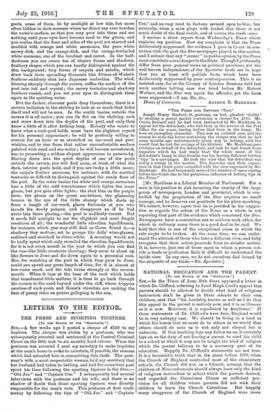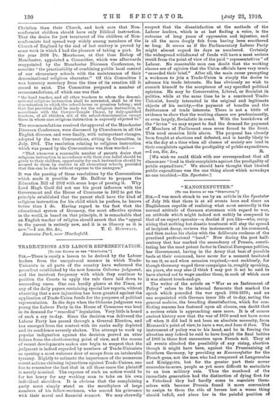NATIONAL EDUCATION AND THE PARENT.
[TO THY EDITOR OP THE "SPECTATOR."] the Times of June 30th there appeared a letter in which Dr. Clifford, referring to Lord Hugh Cecil's appeal that parents should be allowed to decide what kind of religious instruction shall be given in State schools to their own children, said that "his Lordship knows as well as I do that this appeal to the parent is entirely new, and it is as illusory as it is new. Moreover, it is repudiated by Anglicans." If these statements of Dr. Clifford's were true, England would be in very unhappy case. We should be living in a land in which the lesson that we must do to others as we would that others should do unto us is not only not obeyed but is unknown. If that teaching lays any duties on us, it certainly lays on us the duty of not forcing a parent to send his child to a school at which it may not be taught the kind of religion which the parent believes to be a necessary part of its education. Happily Dr. Clifford's statements are not true. It is a lamentable truth that in the years before 1870, when the Church of England controlled most of the elementary schools, the Church did not, as a Church, arrange that the children of Nonconformists should always have only the kind of religious instruction in school which the parents desired, and regarded the Conscience Clause as sufficient pro- vision for all children whose parents did not wish their children to learn the Church Catechism. But happily many clergymen of the Church of England were more
Christian than their Church, and took care that Non- conformist children should have only Biblical instruction. That the desire for just treatment of the children of Non- conformists had spread very widely among members of the Church of England by the end of last century is proved by some work in which I had the pleasure of taking a part. In the year 1898 Dr. Moorhouse, at that time Bishop of Manchester, appointed a Committee, which was afterwards reappointed by the Manchester Diocesan Conference, to consider "the practicability of combining public local control of our elementary schools with the maintenance of their denominational religious character." Of this Committee I was honorary secretary from the time of its creation till it ceased to exist. The Committee prepared a number of recommendations, of which one was that
" the head teacher, and all other teachers to whom the denomi- national religious instruction shall be entrusted, shall be of the denomination to which the school-house or premises belong ; and that due provision shall be made for the religious instruction, in accordance with the Cowper-Temple Clause, by duly-qualified teachers, of all children not of the school-denOmination except those in whose case religious instruction is expressly objected to."
The recommendations received the approval of the Manchester Diocesan Conference, were discussed by Churchmen in all the English dioceses, and were finally, with unimportant changes, adopted by the two Convocations, sitting in Committee, in July, 1901. The resolution relating to religious instruction which was passed by the Convocations was thus worded :-
"That whenever a reasonable number of parents desire that religious instruction in accordance with their own belief should be given to their children, opportunity for such instruction should be secured to them by statute in all elementary schools, provided that this can be done without expense to the managers " It was the passing of these resolutions by the Convocations which made it possible for Mr. Balfour to prepare the Education Bill of 1902 with some hope of passing it. Why Lord Hugh Cecil did not use his great influence with the Government and the House of Commons in 1902 to get the
principle established that the parent shall have the kind of religious instruction for his child which he prefers, he knows better than I do. Having regard to the fact that the educational system of Germany, the most effective system in the world, is based on that principle, it is remarkable that an English teacher of religion should assert that the "appeal to the yarent is entirely new, and it is as illusory as it is new."—I am, Sir, &c., T. C. HORSFALL.
Swanscoe Park, near Macclesfield.







































 Previous page
Previous page